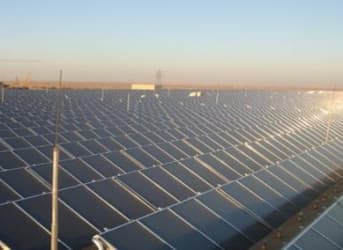Even as Saudi Arabian officials continue to tout its shift to renewable energy, it may be oil-poor countries in the region like Jordan and Egypt that can benefit sooner from falling prices in solar power.
“Costs have halved in just three years,” energy consultant Robin Mills noted last week, “meaning solar can now beat all conventional generation apart from the very cheapest gas.”
Mills cited the bids in Jordan’s recent solar auction, which were just over 6 US cents per kilowatt-hour. These were just slightly above the record 5.84 cents from Acwa Power last November for the 200 MW second phase of Dubai’s Mohammed bin Rashid Al Maktoum solar park.
It could be Egypt’s turn next, Mills suggested, as the North African country struggles with a gas and power crisis and is reportedly working on 6,500 MW of solar deals. Related: Investors Turning Away From Green Energy
“Petroleum-poor countries such as Jordan should seize the opportunity now to boost their economic and energy security,” Mills, the head of consulting for Dubai-based Manaar Energy, urged in an article for Abu Dhabi’s “The National.”
In general, the expert said, any country burning oil for power – including oil-rich countries such as Saudi Arabia, Kuwait, Iraq and Iran as well as oil-poor countries like Jordan and Egypt – should replace this with solar as much as possible.
Egypt, as well as Kuwait and Dubai, could also save on imported liquefied natural gas by switching to solar, even though LNG prices have dropped sharply, he said.
The prospects for solar in the Middle East-North Africa (MENA) region are even more promising than forecasted in Manaar’s optimistic 2012 study, “Sunrise in the Desert,” Mills said.
The new evidence of plunging costs for solar in MENA come as Saudi Arabian oil minister Ali al-Naimi reiterated the kingdom’s plans to become a “global power” in solar and wind energy.
“In Saudi Arabia, we recognize that eventually, one of these days, we’re not going to need fossil fuels,” Naimi said at a climate change conference this month [May] in Paris. “I don’t know when - 2040, 2050 or thereafter. So we have embarked on a program to develop solar energy.” Related: Top Wind Energy Stocks For Renewables Investors
The recent decline in oil prices won’t make solar power uneconomic, the influential official said. “I believe solar will be even more economic than fossil fuels,” Naimi told those attending the Business & Climate Summit at Unesco headquarters.
With its previously announced plans to develop solar and wind power, Saudi Arabia hopes one day to be exporting “gigawatts of electric power” instead of fossil fuels.
The 2012 report from Manaar, produced in collaboration with PricewaterhouseCoopers and the Emirates Solar Industry Association, identified half a dozen different ways various countries in the MENA region can benefit from increased use of solar power.
For one group – Jordan, Morocco, Lebanon, and the northern emirates in United Arab Emirates – solar power can save on high-cost oil imports. In countries like Saudi Arabia, Kuwait and Syria, solar can free up domestic oil consumption for export. For others, like Dubai and Tunisia, it can save on high-cost gas imports.
Other countries – Iraq, Libya and Yemen – can rely on solar while developing domestic gas resources. Another group – including Algeria, Abu Dhabi, Iran, and Oman – can free up gas consumption for export. Qatar, which limits gas exports as a matter of policy, is a case apart and would not find solar economic in the immediate future. Related: The Oil Glut is Not Real
In short, solar has enormous benefits for nearly all countries in the region, even when taking into consideration their different circumstances.
In his new article, Mills sees the region poised to enter a third generation of solar power development, after a first generation of heavily subsidized pilot projects and the current generation becoming the cheapest energy source on its own.
The third generation must address the problem of intermittency, he says – meeting the need for electricity outside periods of maximum solar output. Possible solutions include grid interconnections with countries that have different demand patterns; energy storage, especially if there are further breakthroughs on battery costs; and better demand management.
Another issue that needs to be addressed in the third generation, Mills said, is meeting the demand for desalinated water. This is currently dealt with by using the waste heat from gas-burning power plants. Possible solar solutions would use solar electricity to drive reverse osmosis plants or use the sun’s heat directly for desalination.
By Darrell Delamaide of Oilprice.com
More Top Reads From Oilprice.com:
- Is This The Efficiency Breakthrough Solar Has Been Waiting For?
- E.U. Could Provide Push U.S. Needs To Lift Energy Export Limits
- Could The New Silk Road End Old Geopolitical Tensions?



















But becoming a "global superpower" in solar requires major solar exports in either products, energy or technology. The solar products market is enormously competitive; and the commercial and political case for exports of electricity beyond the GCC or neighboring countries is also challenging.
It will require an unprecedented program of well-designed investment in technology and human capital to achieve this goal. Possible, but very challenging.